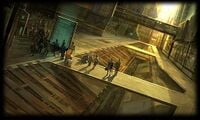Harvest
From Halopedia, the Halo wiki
Harvest was the seventeenth UNSC colony world, and one of the most remote. Located in the Epsilon Indi System[1], the planet had the unfortunate distinction of being the first human planet discovered by the Covenant. After disastrous First Contact, the planet was subsequently destroyed by the Covenant during the Battle of Harvest, and most of its population was killed.
Population
Harvest was one of the UNSC's more productive and peaceful colonies, within two decades of its founding it had the highest per capita agricultural production of any colony. Major crops, such as corn, wheat, watermelons, peaches, apples, grapes, and numerous other foodstuffs fed the inhabitants of more than half a dozen other colonies. The population of Harvest was three million but was destroyed by the Covenant in 2525 by invasion and orbital bombardment. The capital city and largest population center was Utgard, also home to Harvest's seven space elevators connected to the Orbital Space Station, Tiara.
Topography
Harvest was a small planet, approximately one-third the size of Earth with only a 4,000 kilometer (2,484 mile) equatorial diameter, slightly smaller than the Sol planet Mercury.[2] In terms of surface area, Harvest possessed ~50 million km², roughly one-tenth the surface area of Earth. Harvest orbited Epsilon Indi extremely quickly, much faster than most UNSC colonies, at roughly 150,000 km/h, or ~41km/sec (by comparison, Earth orbits Sol at roughly 30 km/sec). Harvest had no natural satellites. Out of a total of five planets in the Epsilon Indi System, Harvest was the only habitable planet. The super-continent Edda dominated the planet, taking up roughly 2/3rds of its surface. Two low-salinity seas covered the remainder of the planet, Hugin to the north, and Munin to the south.[3]
Harvest's surface was once beautiful, covered in grassland and forests, lush fields and rolling hills, and a thousand lakes swarming with swarms of fish. The orchards were filled with fruit trees that were able to grow several different fruit on it at once. At one point Sergeant Johnson grabs an apple from one of these trees, but reaches deeper for a pear instead. At night, bats filled the skies.[4] After being glassed, the surface was reduced to a layer of melted glass, the destruction visible from orbit.[5] The environment suffered a catastrophic blow as a result, with most species quickly going extinct due to the intoxicated environment. Soon, all that remained of Harvest's original natural ecosystem were the scavengers, feeding off the rotting remains of the planet's once abundant wildlife.
History
In 2502, Avery J. Johnson was involved in the assassination of Jerald Mulkey Ander, the head of the People's Occupation Government on Harvest as part of the ORION Project's Operation: KALEIDOSCOPE. Approximately at this time, Harvest was home to 3,000,000 residents, and Utgard wasn't much more than a few blocks of polycrete pre-fab buildings.
Harvest was the first colony to be attacked by the Covenant and the first human world to be glassed. It was also the first time humanity had made contact with the Covenant. Harvest was one of the Covenant's holy planets. Upon discovering that humans had settled on it, they became outraged and glassed the planet and vowed to destroy the humans entirely. Obviously, the resulting war has created less than desirable relations with the alien superpower.[6]
In 2524 Sergeant Johnson returned to Harvest along with Staff Sergeant Byrne and Captain Ponder, all survivors of Operation: TREBUCHET, to train a Colonial militia, and unbeknown to them, fend off what UNSC had believed to be Insurrectionist attacks on ships in the systems.
Escape from Harvest
They soon found themselves in the middle of the first battle between the Covenant and humanity, using their newly trained militia to herd hundreds of thousands of civilian survivors from Gladsheim, Vigrond, and other locations to Utgard Space Elevators to escape the planet. During the first Covenant attack on Harvest about +250,000 humans managed to escape the planet by packing into 236 freight containers which were then loaded into seven elevator depots in Utgard. Every five to seven minutes, seven pairs of freight containers were loaded into the Space Elevator. Loaded ahead of these freight containers were seven "grease buckets", maintenance containers, two which were loaded with Johnson's men and Jilan al-Cygni. The other five were decoys rigged with claymore mines which were used to soften the Brutes, Grunts and Drones which had boarded and taken control of Tiara.[7] While the other two "grease buckets" holding Johnson and Co. stopped and they were fighting off the Covenant, the number seven strand of the Space Elevator snapped a few thousand kilometers above its anchor due to the stress caused by the load becoming unbalanced. There were 11 pairs of freight containers on the strand when it snapped, killing around 20,000 people.[8] The remaining freight containers carrying the survivors of Harvest continued up the elevator, out into space, where they met up with propulsion pods that Sif had placed previously. Once Johnson and Co. finished fighting the Covenant on the Tiara, they joined the survivors and used the propulsion pods to enter Slipspace. [9] In these freight containers was at least one future member of the Spartan-III project.
After the First War on Harvest
Vice Admiral Preston Cole fought in and barely won the Battle of Harvest in 2531, six years later. This battle was the single most titanic battle ever fought by the two opposing forces before the Fall of Reach in 2552, and resulted in the creation and implementation of the Cole Protocol.
Sources
- ^ Halo: Contact Harvest, page 32
- ^ Halo: Contact Harvest, pg 33
- ^ Halo: Contact Harvest, pg. 74
- ^ Halo: Ghosts of Onyx, page 75
- ^ Halo: The Fall of Reach
- ^ Halo: The Fall of Reach, page 96
- ^ Halo: Contact Harvest p.351-52
- ^ Halo: Contact Harvest p.372
- ^ Halo: Contact Harvest p.352
